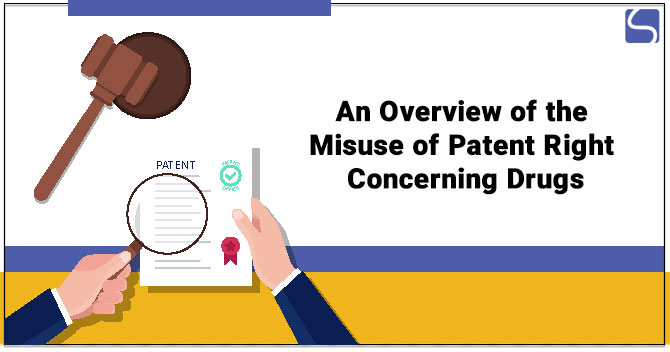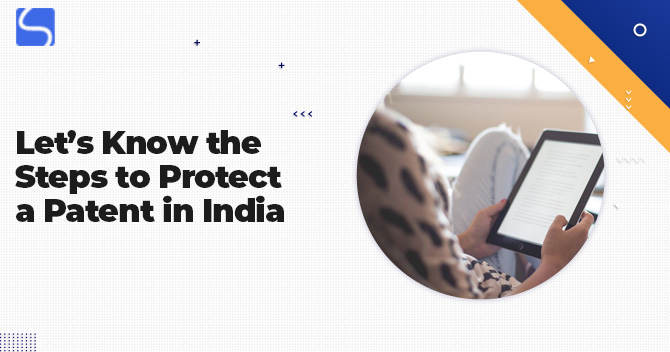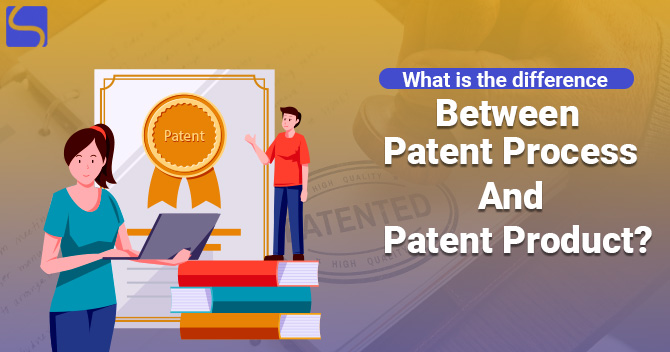An Overview of the Misuse of Patent Right Concerning Drugs

Karan Singh | Updated: May 18, 2021 | Category: Patent
Patent right is not a complete monopoly right concerning the manufacturing of drugs. It’s a limited right and is subject to particular approved limitations. The patent Act stabilizes the individual right of the Patentee and the public’s interest. The key purpose of the Patent Act is to inspire the development of technology and innovation. The Patent Act delivers protection to an inventor for their invention, offering them with the exclusive right and security from infringement or violation or any unauthorized use of a specific invention by any other person. The Government grants the rights to the Patentee after Patent Registration. In this blog, we are going to discussing the misuse of Patent right concerning drugs.
Table of Contents
What are the Rights of Patentees under the Patent Act? – Patent Right
Section 48 of the Act talks about the Patent rights granted to the Patentee. The section consults the Patentee with the right to prevent any third party from creating, selling, using the products in India in case of product Patent. Similarly, in the case of the Patent process, the Patentee has an exclusive right to avoid any third parties from utilizing the process for the sale of any patented product obtained directly by that process. Section 47 of the Patent Act delivers particular conditions where the exclusive rights of Patentee are limited by particular acts:
- Any product concerning the Patent is granted can be made/imported by the Government for its use;
- Any process concerning the Patent is granted can be utilized by the Government for its use;
- Any process or product concerning the Patent is granted can be used/made by any individual for the purpose of research or experiment;
- In the case of any drug Patent, the medicine can be imported by the Government for the ambit of its use or distribution in any medical institute or any hospital engaged by the Government.
It should be recognized that there is another defined Act that doesn’t amount to infringement of the Patent right.
When are the Patent Rights not getting violated?
Section 49 of the Patent Act delivers the Patent rights are not get violated when used on overseas vessels accidentally. The utilization of the creation on vessel or aircraft recorded in a foreign nation or a land vehicle owned by an individual who is a resident of another nation who comes to India fortuitously will not violate the Patentee rights.
Provisions of Patent for the Public Interest:

- Bolar-like Provision-Manufacturing of Drug: Different nations permit the manufacturing of generic drugs that use the patented inventions to develop those drugs. The details are needed to be submitted under the Patent Law. The producers of generic drugs can advertise their adaptation as soon as the Patent of the actual drug expires. This provision is recognized as a “Bolar-like Provision”, or regulatory omission is delivered under Section 107A (a) of the Patent Act[1].
- Parallel Import Provisions: Such provisions are described in Section 107A (b), which states the import of patented product by the Patent owner. It will not be considered a Patent infringement. Hence, it is likely to import any patented product from the license in any nation without prior permission from the owner of the Patent. The role of Parallel Import is to make sure the misuse of Patent rights and proposed to manage the cost of Patent registered products. Section 107A of the Act delivers certain provisions that state the conditions not to be considered as Patent violation.
- Working of Patented Invention: Government ensures that no Patent is utilized commercially in India and is available in the market for the general public. Government make sure that there is no utilization of Patent right. Patents are granted for the cause to promote inventions that can develop industrial development and have to be worked to their complete extent within India.
Common Principles Relevant to working of Patented Inventions
Section 83 of the Act clearly mentions the Patents are allowed to promote the creation and to protect the creation is worked in India on a profitable scale. It points to see that the Patent right is not utilized by the Patent owner or any individual procuring the Patent title. Patents are allowed to take the benefits of the patented invention available at reasonable costs to the general public. Granted Patent doesn’t forbid Central Government from taking actions to safeguard public health. For this purpose, the Government allows every Patent owner to submit a statement concerning the operation of the invention every year.
Statement Concerning Patent Working
Every Patent owner and their assignee are needed to submit a statement yearly by the Government to represent the level at which the patented invention has been commercially used in India. Non-submission of such detail annually can lead to the grant of compulsory license on the patented invention.
The particulars required to be submitted concerning the usage of the invention is to represent whether the discovery has been commercially utilized or not. If it is not exploited, then the primary reason behind its non-exploitation and the steps taken for its utilization are needed to be submitted. If it is utilized, then the information concerning the capacity and worth of the patented product manufactured in India and imported from other nations are to be provided.
Compulsory Licenses
Such licenses are easy to get to as a remedy against misuse of Patent right in India. The uses of Compulsory License are as follows:
- The provisions of such licenses are made to prevent the Patent exploitation as a monopoly and to stop the commercial abuse;
- If any patented invention is not exploited, then there occurs a chance of grant of such licenses by the controller of the Patent on the proposed Patent.
Any individual concerned can file an application for a compulsory license to the controller on any of the following grounds:
- Sensible necessities of the public concerning the patented invention not being pleased;
- The patented invention is not obtainable to the public at an affordable cost;
- The invention is not used in India.
Hence, in the occurrence of a National Emergency or any extreme urgency or public non-commercial usage consisting of a public health crisis like any epidemics to avoid any hold-up in the process, provisions under Section 87 will not be relevant. The compulsory license under the Patent must be available to the public at reasonable prices.
Conclusion
A patentee has the right to choose who can use the patented invention for the time for which the invention is protected. After procuring Drug License concerning Drug Patents, the safeguard of generic drugs is given to the Patentee. In other words, Patent security describes that the invention cannot be commercially made, utilized, imported, distributed, or put on sale by others without the approval of the Patentee. By doing such things as mentioned above, you infringe the Patent Right of the owner.
Read our article:A Complete Guide on Patent Filing Procedure in India














